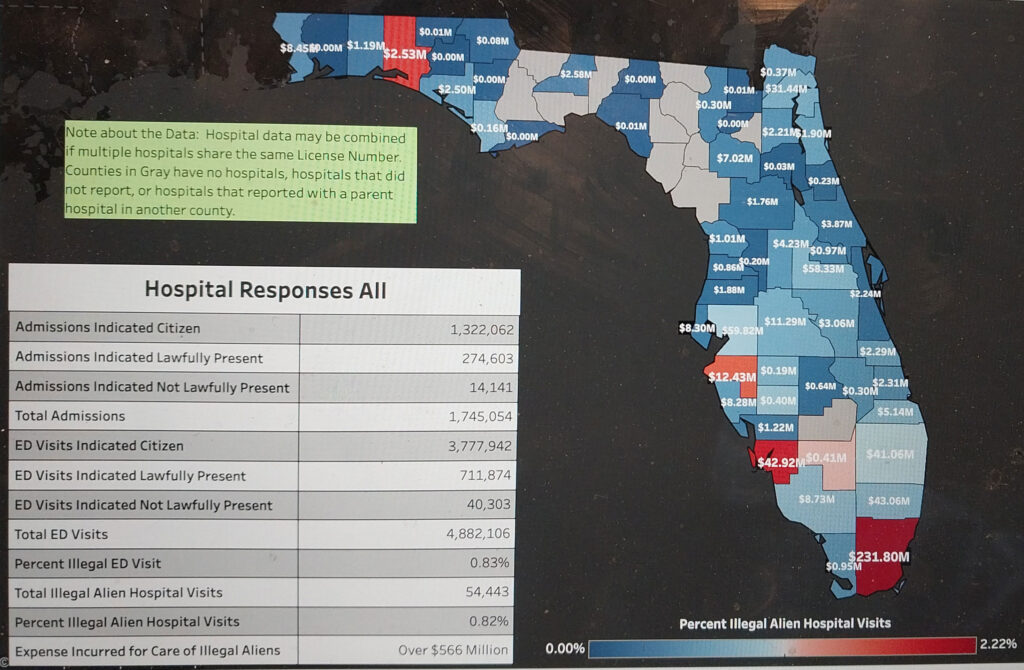Florida has launched a dashboard that reports the total cost of uncompensated health care for illegal immigrants, which currently tops $566 million.
Announced on Wednesday, the interactive Hospital Patient Immigration Status Dashboard highlights “the cost of illegal immigration, which puts a strain on our health care system and taxpayers here in Florida,” the secretary of the Florida Agency for Health Care Administration, Jason Weida, explained in a news release, emphasizing, “Our hospitals and health care systems are designed to provide quality services to the citizens of the United States.”
The dashboard offers county-level information about total expenses incurred by illegal aliens’ hospital visits in Florida. Southeastern Florida’s Miami-Dade County appears to have the highest amount of such expenses, as of this writing estimated at a whopping $231.8 million.
“The goal of our dashboard is to highlight the impacts of illegal immigration on our health care system and the ways it continues to put a strain on health care resources and ultimately drive up health care costs for United States citizens,” said Brock Juarez, assistant deputy secretary at the Florida Agency for Health Care Administration and its communications director.

Screenshot of Hospital Patient Immigration Status Dashboard from website. (Photo: Peter Parisi/Daily Signal)
The dashboard also calculated that a total of 54,443 emergency medical visits and hospital admissions were made by illegal immigrant patients.
The newly launched dashboard is designed to allow the public to click on each county and view its expenses incurred from illegal aliens’ hospital visits.
The counties on the dashboard are illustrated with shades of blue to red, with the latter indicating the highest percentage of illegal immigrants’ hospital usage.
According to the Florida Agency for Health Care Administration’s news release, the total cost of care provided to illegal immigrants in Florida has exceeded $566 million, based on admissions data from June 1, 2023, through Dec. 31, 2023.
“As shown in the reported information, illegal immigration has a clear and direct impact on the cost of health care within the United States,” Juarez said. “The current rise in illegal border crossings nationwide, due to the failed policies of the Biden administration, continues to put a large strain on our hospitals and health care systems, which negatively impacts both the cost and quality of service for United States citizens.”
“Policy should not be made in the dark. Whether they are for open borders or law enforcement, American voters need to know the real costs,” said Simon Hankinson, senior research fellow at The Heritage Foundation’s Border Security and Immigration Center. (The Daily Signal is the news outlet of The Heritage Foundation.)
Hankinson added, “States and cities should report data on illegal immigrant education, health care, and other costs borne by taxpayers. State, local, and tribal police should check and report the immigration status of all encounters—which can be done through the automated checking of fingerprints, without any kind of profiling.”

Applauding Florida Gov. Ron DeSantis’ decision to launch the public information dashboard, Hankinson noted, “From criminal justice to illegal immigration, when our leaders hide the data, it means they know their policies aren’t working and are ashamed of the results.”
Weida, the Florida health care agency chief, explained, “Gov. DeSantis continues to put Floridians first with his commitment to fiscal responsibility and prioritization of the needs and care of citizens first.”
Editor’s note: This article has been updated since publication.
Have an opinion about this article? To sound off, please email letters@DailySignal.com, and we’ll consider publishing your edited remarks in our regular “We Hear You” feature. Remember to include the URL or headline of the article plus your name and town and/or state.




























